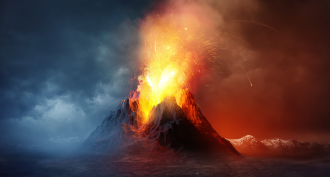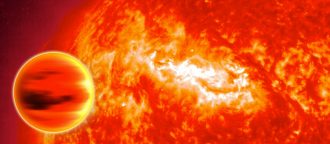
Stephen Ornes has been writing for Science News Explores since 2008, and his 2014 story "Where Will Lightning Strike?" won an AAAS/Kavli Gold Award. He lives in Nashville, Tenn., and he has three children, who are inventing their own language. His family has a cat, six chickens, and two rabbits, but he secretly thinks hagfish are the most fascinating animals. Stephen has written two books. One is a biography of mathematician Sophie Germain, who was born during the French Revolution. The other, which was published in 2019, features art inspired by math. Visit him online at stephenornes.com.

All Stories by Stephen Ornes
-
 Fossils
FossilsDino drama
Scientists study skulls to determine whether Triceratops and Torosaurus were two different species.
-

-
 Earth
EarthTwist and shake
A new look at the shape of the San Andreas Fault suggests future earthquakes may be stronger than previously thought.
-
 Fossils
FossilsEarly toehold on land
A five-toed fossil now holds the record for smallest, oldest foot ever found.
-
 Physics
PhysicsToo fast to be true
Last September, scientists working on an Italian experiment called OPERA reported a measurement that seemed too amazing to be true. Their finding involved neutrinos, supersmall and ultrafast particles that can travel through almost anything without stopping. The scientists measured the speeds of neutrinos that zipped from one underground laboratory to another and reported that the zippy little particles traveled faster than light. In November, they repeated the experiment and got the same results.
-

-
 Health & Medicine
Health & MedicineLosing control over sugar
A common pollutant and sweetener mess with important hormones.
-
 Climate
ClimateSudden big chill
Earth’s climate cooled quickly at the beginning of the Little Ice Age, hundreds of years ago.
-
 Planets
PlanetsWorlds beyond the solar system
Planet hunters have found hundreds of exoplanets, but none just like Earth.
-
 Space
SpaceSurprise ions
A high-flying satellite reveals a crowd of charged particles in the magnetosphere.
-
 Animals
AnimalsCosts of missing sleep
Some fruit flies do fine without sleep, as long as they’ve got enough to eat.
-
 Animals
AnimalsPythons overtake Everglades
In southern Florida, giant snakes change the ecosystem one meal at a time.